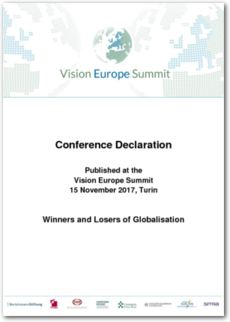Winners and Losers of Globalization
- Ausgabeart
- Erscheinungstermin
- 01.12.2017
- Auflage
- 1. Auflage
- Umfang/Format
- 5 Seiten, PDF
Format
-
PDF
Preis
kostenlos
Beschreibung
At the Vision Europe Summit, which took place in Turin in November 2017, the leaders of eight European Think Tanks and foundations published this conference declaration. Globalization brought growth and prosperity to many countries but also enhanced inequalities within as well as between countries.
This unequal distribution of the gains of globalization created social, economic and political challenges in many countries. The speed of the change induced by globalization as well as technological progress generates hopes but also fears. There is a need to ensure that economic globalization makes Europe not just more prosperous but that the benefits of this prosperity are shared across society. It is therefore urgent to implement a pro-active agenda at the level of the EU and its member states to make open societies and open economies sustainable.
The declaration mentions the following seven principles, which should guide the agenda on the European as well as the national level.
1. Open economies should be inclusive. The benefits of growth need to be spread across society, and individuals given support in adapting to economic change.
2. Social welfare systems should be designed as an investment, to ensure a safety net but also to support and empower citizens to succeed in a changing labour market.
3. Progress requires good institutions. Reform has the best chance of success if it is built upon capable, accountable and responsive institutions.
4. Prioritize the development of new engines of economic growth, which is ecologically sustainable. Only an economically sustainable Europe will be well placed to strengthen social policies.
5. Strengthen democratic processes, which face challenges in many areas from a lack of institutional trust and voter apathy.
6. The EU’s collective strength is a key asset. The EU offers the best chance through which to devise such solutions, because its scale is large enough to preserve the gains from openness while constituting an arena for the legitimate and viable creation of new tools for necessary regulations.
7. The EU should support and defend a rule-based international order. Despite their relatively weak position at present, the EU and its neighbours, including the UK, should continue to do all they can to sustain an international order adhering to a rules-based system, which offers the best chance of addressing global challenges.
The conference declaration continues with concrete policy proposals how these principles can be put into practice at the national, the European and the international level.
Policies at the national level will have to focus more on social investment in order to enable people to adapt and thrive amid socio-economic change and technological disruptions.
The EU should support these developments by promoting and incentivising a reorientation of national policies towards social investment. One way forward is to supply tangible resources to member states to overcome policy lock-ins. In addition, a revised Globalization Adjustment Fund and a mechanism of European solidarity to absorb shocks represent ways forward.
At the international level, the EU and Britain should ensure that they remain close partners. Europe should maintain the foundations of transatlantic relations, based on shared values and common rules. In addition, it will have to engage constructively with major emerging economies, in particular China.



